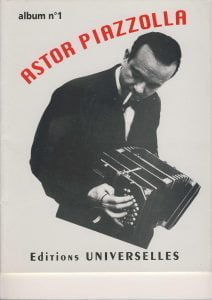Browse in the Library:
Search Posts by Categories:
Astor Piazzolla Oblivion (Astor Piazzolla) played by Nadja Kossinskaja, guitar (with sheet music)
Best Sheet Music download from our Library.
Astor Piazzolla
Astor Pantaleón Piazzolla (March 11, 1921 – July 4, 1992) was an Argentine tango composer, bandoneon player, and arranger. His works revolutionized the traditional tango into a new style termed Nuevo tango, incorporating elements from jazz and classical music. A virtuoso bandoneonist, he regularly performed his own compositions with a variety of ensembles.

In 1992, American music critic Stephen Holden described Piazzolla as “the world’s foremost composer of Tango music”.
After leaving Troilo’s orchestra in the 1940s, Piazzolla led numerous ensembles beginning with the 1946 Orchestra, the 1955 Octeto Buenos Aires, the 1960 “First Quintet”, the 1971 Conjunto 9 (“Noneto”), the 1978 “Second Quintet” and the 1989 New Tango Sextet. As well as providing original compositions and arrangements, he was the director and bandoneon player in all of them. He also recorded the album Summit (Reunión Cumbre) with jazz baritone saxophonist Gerry Mulligan.
His numerous compositions include orchestral work such as the Concierto para bandoneón, orquesta, cuerdas y percusión, Doble concierto para bandoneón y guitarra, Tres tangos sinfónicos and Concierto de Nácar para 9 tanguistas y orquesta, pieces for the solo classical guitar – the Cinco Piezas (1980), as well as song-form compositions that still today are well known by the general public in his country, including “Balada para un loco” (Ballad for a madman) and Adiós Nonino (dedicated to his father), which he recorded many times with different musicians and ensembles. Biographers estimate that Piazzolla wrote around 3,000 pieces and recorded around 500.
In 1984 he appeared with his Quinteto Tango Nuevo in West-Berlin, Germany and for television in Utrecht, Netherlands. In the summer of 1985 he performed at the Almeida Theatre in London for a week-long engagement. On September 6, 1987, his quintet gave a concert in New York’s Central Park, which was recorded and, in 1994, released in compact disc format as The Central Park Concert.
The Origin of the song ‘Oblivion’
Argentine tango composer Astor Piazzolla created the piece ‘Oblivion’ in 1982. It was famously featured in the 1984 Italian film ‘Enrico IV’ (‘Henry IV’) directed by Marco Bellocchio. The song has been described as “haunting” and “atmospheric,” and is considered to be one of Piazzolla’s most popular tangos.
The film ‘Enrico IV’ was adapted from the play by Luigi Piradello. The lead character is an actor-historian who suffers a fall during an historical pageant. Upon regaining consciousness, he assumes the identity of the character he was playing, the Holy Roman Emperor Henry IV. The nostalgic tune starts out as a slow milonga, a genre of Uruguay and Argentina music considered to be a forerunner of tango.
Milonga dance allows for a great relaxation of the legs and body. Movement is faster with less pauses. The dance mimics a kind of rhythmic walking without complicated figures.
‘Oblivion’ has many recorded versions, including for klezmer clarinet, saxophone quartet, and oboe and orchestra. The featured instrument enters immediately over a subtle, arpeggiated accompaniment with a melody of extreme melancholy — long-held notes alternating with slowly falling and weaving figures. A middle section offers a minimally contrasting theme, lush but less intense.
‘Oblivion’ evokes sadness, despite its lyrics speaking of love. It also has a harmonic sophistication and whispered sadness.
Heavy, suddenly they seem heavy the linen and velvets of your bed when our love passes to oblivion Heavy, suddenly they seem heavy your arms embracing me formerly in the night
My boat parts, it’s going somewhere people get separated, I’m forgetting, I’m forgetting
Later, at some other place in a mahogany bar the violins playing again for us our song, but I’m forgetting
Later, it splits off to a cheek to cheek everything becomes blurred and I’m forgetting, I’m forgetting Brief, the times seem brief the countdown of a night when our love passes to oblivion
Brief, the times seem brief your fingers running all over my lifeline.
Without a glance people are straying off on a train platform, I’m forgetting, I’m forgetting.

Piazzolla revolutionized tango and created nuevo tango (new tango), which is a blend of tango, jazz and classical music. ‘Oblivion’ is considered to be more traditional and less ‘jazzy’. The song was composed during the peak of his career, just a year after he performed in New York’s Madison Square Garden. The 1980’s are considered his most popular years, having held concerts all over the world including Europe, South America, Japan, and the U.S.
He composed music for other films as well and was awarded in 1986 the Cesar Prize for his score for ‘El Exilio de Gardel.’ He has over 90 credits as composer for film and television. As one of their leading tango composers, he was named an exceptional citizen of Buenos Aires in 1986. In 1990, Piazzolla suffered a massive stroke and two years later, the Tanguero died in Buenos Aires on July 4. He leaves behind more than 1,000 works and the legacy of having revolutionized tango forever.

One response to “Oblivion (Astor Piazzolla) by Nadja Kossinskaja, guitar (with sheet music)”